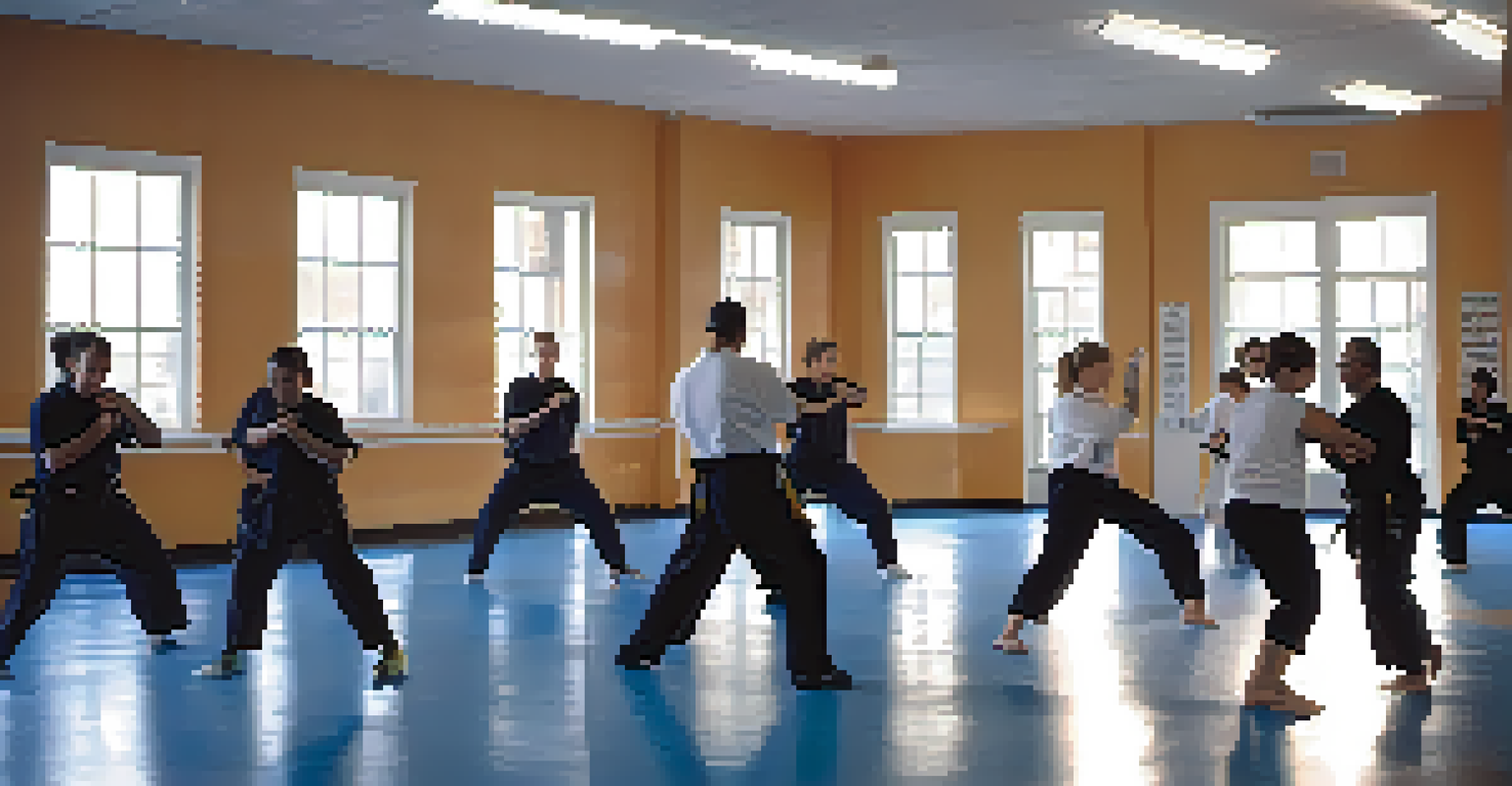Top 10 Escape Techniques Everyone Should Master for Safety

Understanding Situational Awareness for Safety
Situational awareness is your first line of defense. It means being aware of your surroundings and the people in them. By paying attention to the environment, you can spot potential dangers before they escalate.
The greatest weapon against stress is our ability to choose one thought over another.
Imagine walking through a park and noticing someone acting suspiciously. If you're alert, you can change your path or find a safe place to wait. This proactive approach can help you avoid uncomfortable or dangerous situations.
To improve your situational awareness, practice mindfulness and regularly assess your surroundings. Being aware of exits, potential threats, and safe zones can make a significant difference in your safety.
Mastering the Art of De-escalation
De-escalation techniques are vital in tense situations. They involve calming an aggressive person or diffusing a conflict before it turns violent. This skill can be incredibly useful when faced with hostility.

For example, if someone confronts you aggressively, using a calm tone and open body language can help ease the tension. By acknowledging their feelings and seeking to understand, you may be able to resolve the situation peacefully.
Stay Aware for Safety
Being aware of your surroundings helps you spot potential dangers and avoid risky situations.
Practicing active listening and empathy can enhance your de-escalation skills. Remember, your goal is to defuse the situation, not to prove a point or escalate further.
Basic Self-Defense Techniques Everyone Should Learn
Basic self-defense techniques can empower you to protect yourself in threatening situations. These skills don’t require extensive martial arts training but can be incredibly effective in a pinch. Simple moves like blocking or escaping a hold can make a huge difference.
In the midst of movement and chaos, keep stillness inside of you.
Consider a scenario where someone grabs your wrist. A basic escape technique involves twisting your wrist and stepping back to create distance. This can give you the opportunity to run away or call for help.
Taking a self-defense class can provide you with these essential skills. Plus, the confidence you gain from knowing how to defend yourself is invaluable.
Using Environmental Awareness to Your Advantage
Your environment can be your ally in escape scenarios. Knowing how to use objects around you as barriers or distractions can buy you valuable time. For instance, if you're in a crowded area, finding a group of people can help you feel safer.
Think of it like being in a maze; the more you know about the layout, the easier it is to navigate. If you're aware of nearby doors, exits, or obstacles, you can quickly choose the safest path to escape.
Practice Self-Defense Techniques
Learning basic self-defense techniques empowers you to protect yourself in threatening scenarios.
Practice visualization techniques where you mentally map out your surroundings. This preparation can help you react swiftly and effectively when faced with a threat.
The Importance of Physical Fitness for Quick Escapes
Physical fitness plays a crucial role in your ability to escape dangerous situations. Being in good shape allows for faster reactions and greater endurance, which can be critical when you need to run away. Regular exercise not only builds strength but also enhances your overall confidence.
Imagine being able to sprint away from a pursuer or climb over obstacles without hesitation. The more physically prepared you are, the better your chances of successfully escaping.
Incorporating activities like running, swimming, or martial arts into your routine can significantly boost your fitness levels. Plus, these activities are great for stress relief and overall well-being.
Developing a Personal Safety Plan for Emergencies
Having a personal safety plan is essential for navigating emergencies. This plan should include predetermined safe locations, emergency contacts, and escape routes. By thinking through potential scenarios ahead of time, you can reduce panic and act more decisively.
For example, if you frequently walk home late at night, consider identifying well-lit streets and safe havens you can reach quickly. This preparation gives you a clear course of action if you ever feel threatened.
Create a Personal Safety Plan
Having a well-thought-out safety plan prepares you for emergencies, reducing panic and improving response.
Regularly review and update your safety plan to ensure it remains relevant. Practicing it with friends or family can also help make the plan feel more natural and effective in a real situation.
Utilizing Technology for Personal Safety
In today's digital age, technology can enhance your personal safety significantly. Smartphone apps designed for safety can alert friends or authorities with just a few taps. Making use of GPS tracking or emergency contact features can provide an additional layer of security.
Imagine being in a situation where you feel unsafe; using an app to alert someone can be a lifesaver. Many apps offer features like location sharing, which allows friends or family to know where you are at all times.

Familiarize yourself with available safety apps and choose one that fits your needs. Additionally, keeping your phone charged and easily accessible can make a world of difference in emergencies.
Practicing Escape Techniques Regularly for Retention
Like any skill, escape techniques require practice to retain. Regularly rehearsing these skills can help them become second nature, ensuring you’re prepared when it counts. Consider setting aside time each month to review and practice what you've learned.
Think of it as practicing for a performance; the more you rehearse, the more confident and fluid your actions will be. This can be as simple as role-playing scenarios with friends or taking refresher self-defense classes.
Incorporating these practices into your routine can significantly enhance your readiness and confidence. Remember, being prepared is the best way to ensure your safety.